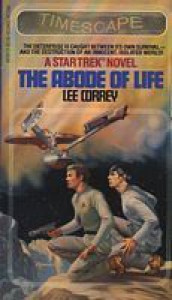Sacrificing suspense for social commentary

There's an episode in the fifth season of Mad Men when the pretentious Paul Kinsey (who had left the ad agency a couple of years previously) reappears and asks Harry Crane, the the head of the firm's television operations, to use his Hollywood connections to get NBC to look at his Star Trek spec script entitled "The Negron Complex" about a world in which a group called the Negrons are enslaved by people of different skin color. When Harry reads it he is appalled by how terrible it is, particularly with the clumsiness of its parallels to civil rights issues. "The twist is that the Negron is white!" he marvels sarcastically.
Ever since I laughed at Harry's deadpan declaration, I keep coming back to it when I encounter other heavy-handed examples of the franchise's commentary on contemporary society, as it came to mind again as I read this book. Written by "Lee Correy" (the pen name for G. Harry Stine), it transports the Enterprise crew to the planet Mercan, where a priest-like leadership known as the Guardians exploit the periodic radiation outbursts from their sun to maintain control over the population. Resisting them are the Technics who, in addition to developing prohibited technologies, are promoting the heretical idea that the Mercans are not the only beings in the universe.
You can guess how that turns out once the Enterprise shows up. And that for me was the big problem with this book, as the author is more focused on criticizing intellectual oppression than he is on developing distinctive characters or writing a suspenseful novel, At no point is there any real sense of narrative tension; the danger to the crew is minimal (the Guardians are very lackadaisical in their handling of Kirk and company), and all it takes to expand the civilization's horizons is a quick trip to the ship. Perhaps if Stine was focused less on setting up such flimsy straw men he might have done more with some of the more interesting ideas he introduces, such as the concept of a teleporter-based civilization. Instead all we have is another weak example of a Star Trek writer who prioritizes their opinionating over telling a good story,






